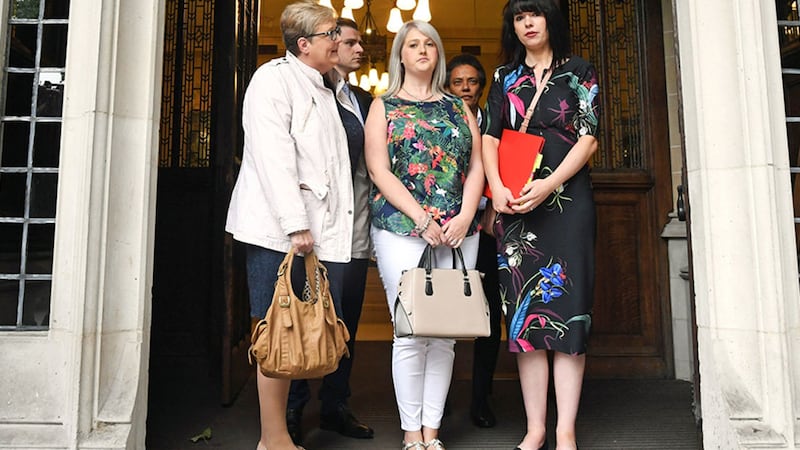Westminster has signalled its displeasure at Northern Ireland’s abortion laws but also its profound reluctance to change them. A Commons debate on the subject was full of insistence something must be done but the one thing all sides agreed on was that Stormont ought to do it, despite no sign of devolution returning. This should have given the DUP space to be gracious but of course that was beyond it, with Sammy Wilson in particular leaving fellow MPs aghast.
Sinn Féin has also overreacted to the prospect of Westminster legislation, which would cause ideological difficulties for republicans. Instead, it wants London and Dublin to arrange new laws in Northern Ireland via the British-Irish Intergovernmental Conference, although that breaches the Good Friday Agreement and makes no legal or constitutional sense.
What the conference can do is assist the restoration of Stormont - a point to which this topic keeps returning.
**
Much hope for Westminster action had been placed on this Thursday’s Supreme Court appeal to uphold a 2015 declaration from a Belfast judge that Northern Ireland’s abortion law is incompatible with the Human Rights Act.
In the end the Supreme Court verdict was mixed, throwing the case out on a technicality despite agreeing the law is incompatible. Yet it was naïve to expect even victory would make Westminster intervene. Government does not have to take any action due to a declaration of incompatibility with the Human Rights Act. A judge can order further action but the judge in Belfast did not do so. The 2015 declaration was issued to Stormont as abortion is devolved and there was no suggestion Westminster should step in if nothing was done. The Human Rights Commission, which brought the case, merely said executive inaction would “take us into uncharted constitutional territory.”
Three years on, the limbo at Stormont makes that sound almost like a punchline.
**
Indirect rule has taken another great leap forward, with civil service chief David Sterling publishing what amounts to a one-year programme for government to give his officials a framework for making decisions.
Entitled the ‘Outcomes Delivery Plan’, it essentially reprints the last executive’s five-year programme for government, which only made it as far as consultation. That programme was meant to be ‘outcomes-based’ - an idea copied from Scotland, where everything the government intends to do is connected to ‘high-level outcomes’. For example, Stormont’s programme promised to build 9,600 social houses by 2021 to serve the outcome of “we care for others and we help those in need”. There were 12 of these incredibly general outcomes served by hundreds of specific policies and Sterling has reproduced them virtually word for word, giving Stormont’s minister-free departments plenty to do, plenty of scope to do anything else plus a democratic fig-leaf for it all.
**
Last month, when Theresa May said only former security force personnel are being “investigated” for Troubles crimes, it was just about explicable as a misunderstanding. That does not explain why she has repeated the claim, once again at prime minister’s question time, in response to Conservative demands for a statute of limitations.
As May ruled out a statute, she was not backsliding on legacy. Nor is it credible that a prime minister would deliberately mislead the Commons in such an obvious manner.
This latest blunder might simply indicate the extent to which May is floundering in general, with too much Brexit on the brain to master any other issue. Her question time performance was judged so poor overall that the Sun said Jeremy Corbyn had her “rattled”.
**
Belfast’s House of Fraser department store has survived a cull of over half the company’s sites. Being in the Victoria Square shopping centre was almost certainly decisive - of all the firm’s stores, only those in large shopping centres will be saved. But with the very concept of a department store now on its last legs, is this a lucky break Belfast should gamble on again?
The city’s North East Exchange redevelopment, over a decade in the planning, is still based around letting one huge retail unit to an anchor tenant. In March, the developer said a “high-profile tenant” was lined up - and hinted it was a department store.
**
East Belfast’s mixed Cantrell Close development, formerly targeted with loyalist flags and death threats, has been adorned with banners memorialising IRA atrocities and bearing the slogan “stand up to sectarianism.”
The banners were erected by the East Belfast Community Initiative, which appears to be making some convoluted two-wrongs-make-a-right point about republican memorialising, judging by statements from its spokesman Jamie Bryson. This is undermined by Bryson declaring republicans to still be wrong, not to mention by singling out mixed housing.
Yet it is all a kind of homecoming for the former flag protester, who began his political career as a teenager in a 2009 dispute with North Down Borough Council. After the council withheld a £150 bonfire grant a group called the Intra-Community Cohesion Project suddenly appeared, with Bryson as its spokesman, and burst the Gold Coast’s middle-class bubble by decking Bangor and Helen’s Bay with union flags.
Once you have used British symbols against an 80 per cent Protestant town, anything is possible.
newton@irishnews.com









